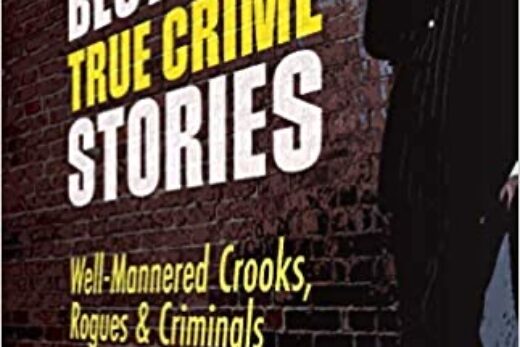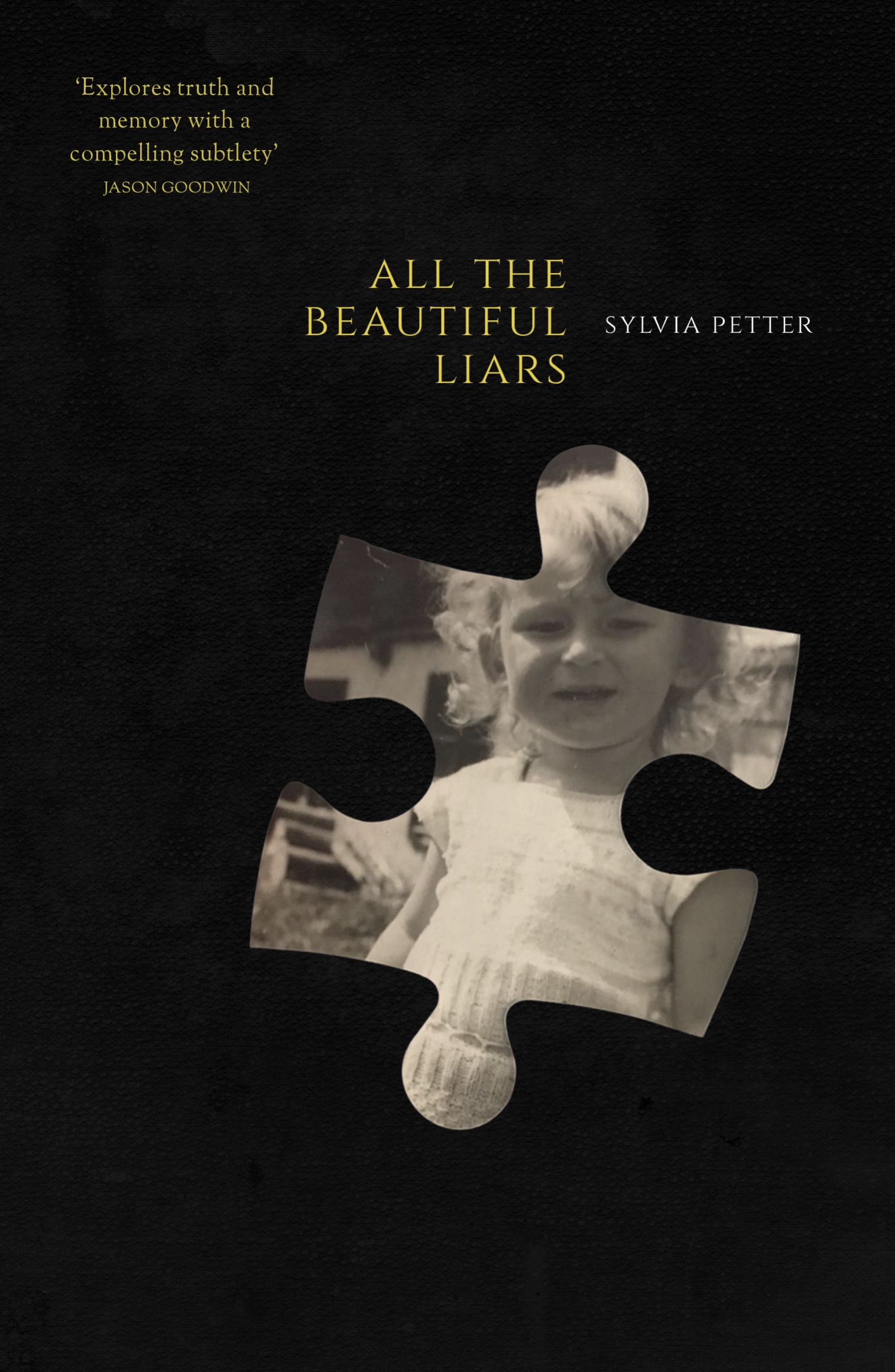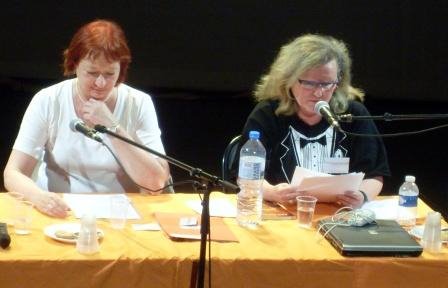Around this time every year Vienna stages a 24-hour reading marathon, Rund um die Burg, held in tents next to the Burgtheater. There’s a kid’s tent Friday and Saturday and the main tent starts Friday at 4pm and ends Saturday at 5pm. Local published authors, big and smaller, get a 30-minute slot. Crime lit is on after midnight and erotica in the wee hours. And it’s all free! (I was privileged to participate in the Schule for Dichtung (Vienna Poetry Academy) class slot on the Saturday back in 2006. Our teacher then was the Viennese songwriter and author, Ernst Molden.)
The day job’s been taking a toll on my time these days, but I couldn’t resist swinging by at 9pm to secure a seat before what turned out to be a full house for Ernst Molden and Michael Niavarani.
Things were running 30 minutes behind schedule so I was in for a pumpkin time. Uschi Fellner, founder of Austria’s Woman magazine and a big name in Austrian publishing introduced Barbara Pachl-Eberhart who read from her diaries. Pachl-Eberhart, a teacher who also volunteered as a clown at children’s hospitals, tragically lost her husband and children in 2008. She received a Leading Lady Award for her strength and optimism. People were very moved by her experience, but as she read from her diaries, with photos of her husband and children, the award ceremony, all on the big screen, I couldn’t help wonder about the need for people to know that stories are “true” and how mediatic presentations of such seemed to make it impossible to see nothing but the message. Is it the “message” we crave in our troubled times as our own form of therapy? “Sadness comes in waves,” she said. Many in the audience nodded. Call me cynical, but I couldn’t join in with clapping.
Then came prize-winning author, Antonio Fian with dream stories, Im Schlaf. I kept wondering who the narrator was as many of the stories talked of writers and publishers. The most humourous were the self-deprecating ones with allusions to bungled situations, some with sexual overtones; the author was definitely not dead as he seemed to insinuate himself into nearly all of the stories. I wondered whether a German-speaking audience had a different take on what I saw as humour. But we were already in that twilight between real life and fiction, the place of dreams, so who was I to scratch my head? The next slot was long fiction, with prize-winning Peter Rosei reading from his novel, Das Grosse Toeten. It’s hard to engage with a 30-minute chunk of a novel, but I did notice the detail used to sketch his believable characters. Then followed prize-winning novelist and poet, Bettina Balaka who read a number of poems from her collection, Schaumschluchten and an excerpt from her novel, Eisfluestern . This was lyrical and serious stuff that did not deserve a thinning of the crowd.
what I saw as humour. But we were already in that twilight between real life and fiction, the place of dreams, so who was I to scratch my head? The next slot was long fiction, with prize-winning Peter Rosei reading from his novel, Das Grosse Toeten. It’s hard to engage with a 30-minute chunk of a novel, but I did notice the detail used to sketch his believable characters. Then followed prize-winning novelist and poet, Bettina Balaka who read a number of poems from her collection, Schaumschluchten and an excerpt from her novel, Eisfluestern . This was lyrical and serious stuff that did not deserve a thinning of the crowd.
But then the room began to fill up as Ernst Molden took the stage, not with a book, but with his guitar, to sing from his latest CD and LP (yes, LP), Ohne Di . “I don’t write books anymore,” he said. (I hope he will write another one though, if only a collation of his weekly column, “Wien Mitte”, in the Saturday Freizeit Kurier.) The man has a way with words in both his written and performed texts. Sit back and relax and dip into a Vienna much earthier and greener than the tourist brochures. 30 minutes were too short as the applause demonstrated, and it was already midnight.
Di . “I don’t write books anymore,” he said. (I hope he will write another one though, if only a collation of his weekly column, “Wien Mitte”, in the Saturday Freizeit Kurier.) The man has a way with words in both his written and performed texts. Sit back and relax and dip into a Vienna much earthier and greener than the tourist brochures. 30 minutes were too short as the applause demonstrated, and it was already midnight.
Call on the clowns. Enter cabaretist and author, Michael Niavarani, Vienna’s own Persian son. A performer, Niavarani, read a series of excerpts from his book, Vater Morgana: eine Persische Familiengeschichte (story of a Persian family). The audience was in stitches as he recounted the strengths and weaknesses of the members of Martin’s (not Michael’s – he could get away with more by saying it was maybe not really all true, erhem) family. When noise from outside got a bit loud, Michael, the performer  said, “Hey, I’m nearly finished,” and that was near the beginning. A great performance. Would I read the book? Yes. But I’d miss his spoken voice, his pauses, his grin, everything that covers up an inherent sadness of the “other”.
said, “Hey, I’m nearly finished,” and that was near the beginning. A great performance. Would I read the book? Yes. But I’d miss his spoken voice, his pauses, his grin, everything that covers up an inherent sadness of the “other”.
Both Molden and Niavarani, in their very different ways, for me held up a true mirror to the human condition, my human condition, that the ‘Truth”, craft, creative non-fiction and lyricism of previous presenters lacked. So I wonder if by stepping outside of ourselves and risking the unexpected we are then able to touch an audience in a manner that resonates beyond just one hearing or reading.





“The most humourous were the self-deprecating ones with allusions to bungled situations, some with sexual overtones;”I would have loved this part! Sounds like a lot of fun!
Thanks, Kathryn. Maybe next year? I must confess that I was a little biased as I wanted to catch the last two acts. But being there earlier got a whole lot of other stuff milling around my head.
I follow you, Rachel, but that first piece, from the diaries, was presented as true and as non-fiction. I think what I objected to was the big photos on the screen as if the words weren’t enough, indeed a sort of Oprah effect. I’ve also had a weird feeling about creative non-fiction, autobiography, too. There is so much the mind can avoid telling the hand or so much more it tells it to embroider. But when something is presented as true, be it nonfic or fiction, the reader is definitely put into a sort of acceptance mode. The fiction writer, though has a bit more work to do in suspending disbelief even though s(he) may draw on “true” events. I’m starting to doubt the validity of that word, “truth”. Now who’s rambling?
A great account of what sounds like a fascinating event. I’d love to go to something similar. In fact, I will add to my mental list of things to do. Thanks!
I think when a piece of writing is described as true but presented as fiction it puts the audience in a strange place…it makes us uncomfortable because are we then supposed to give a truthful reaction? I would never, for example, go to watch the Oprah show, or any other show which asks the sudience to validate what is presented on the stage – which is what it is – and so, to have the audience at a reading become this would have me feeling very at odds…I would have had a similar reaction to you, in that situation, I think. Sorry this is a bit of a rambling comment!